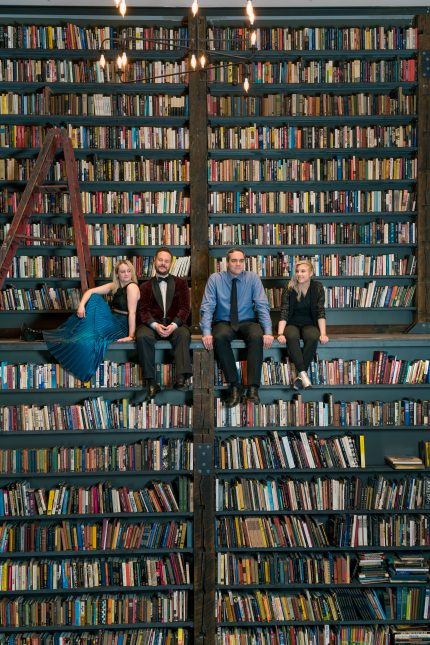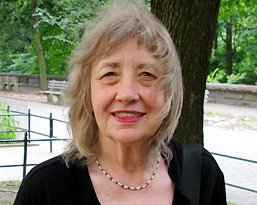Spektral Quartet fetes an American original with Gloria Coates premiere

The list of unjustly neglected American composers is a long and winding road, spanning from the colonial William Billings to the present, and encompassing nearly every homegrown composer whose name isn’t Gershwin or Bernstein.
The Spektral Quartet has made its mark in large part by performing music of living American composers. But the enterprising ensemble has also championed choice repertoire of the past—as with last season’s cycle of Schoenberg quartets and, especially, the Chicago debut of Morton Feldman’s six-hour Quartet No. 2 last year.
Friday night at Rockefeller Memorial Chapel, Spektral notched another milestone by presenting the belated American premiere of Gloria Coates’ String Quartet No. 7—18 years after it was written.
Born in Wausau, Wisconsin, and long resident in Munich, Coates—who will turn 80 on October 10—is an individual, even idiosyncratic voice. She is prolific, having written 16 symphonies to date and nine string quartets (the latter available in a complete box set by the Kreutzer Quartet on Naxos).
Her symphonies are characterized by a mysterious eruptive power—dark, majestic and unsettling in equal parts. Think Morton Feldman crossed with Bernard Herrmann.
Coates’ Seventh Quartet, subtitled “Angels,” is reflective, in many ways, of her style, which is built on minimalist, deceptively simple means. Glissandos and dissonant trills tend to dominate her quartets, alternating with fragments of nostalgic, plaintive melancholy. As Kyle Gann put it, what you often get with Coates is a “poignantly sad tonal melody surrounded by weirdness.”
The weirdness in the Seventh Quartet comes with the prominent organ part, which is coequal with the string players. Written in 2000 and cast in a single 15-minute movement, the music—despite the “Angels” title—seems more of an impressionistic angelic inspiration than a literal one.
The Seventh Quartet is a work of stark conflict and chromatic strife with brief respites of spiritual calm. The quartet begins with beast-like lowing from the organ, answered by the strings with eerie high tremolos and glissandos. The contrasting material alternates and accelerates; the organ embarks on a long crescendo topped by a jarringly massive chord, almost overpowering coming from the mighty Rockefeller instrument.
As with Carl Nielsen, Coates’ musical world is one where order is continually upended by disorder. The irregular string glissandos lead to more agitation, with Cowell-esque organ clusters and thunderous, jabbing chords. Snatches of familiar hymns and carols provide fleeting consolation, with the work ending on an ambivalent note.
The Spektral musicians (violinists Clara Lyon and Maeve Feinberg, violist Doyle Armbrust and cellist Russell Rolen) brought characteristic intensity, laser-like focus and technical sheen to Coates’s quartet, making the strongest possible case for this belated U.S. premiere.
The playing of Mary Pan, organ scholar of St. James Cathedral, was on the same high level. The young organist unleashed the full power of the mighty 8,565-pipe E. M. Skinner organ in the massive chromatic outbursts and her crucial role was superbly rendered throughout. The tricky balancing of strings and organ in the resonant space emerged surprisingly well.
The other major work on the program was Tonia Ko’s Plain, Air. Spektral premiered this environmentally minded commission three weeks ago in an outdoor performance at the north suburban Openlands Lakeshore Preserve.
In her engaging spoken introduction, the composer outlined the five-movement work and how she took her inspiration from sounds of nature, animals and the enivoronment, as well as “our embodied experience of the great outdoors.”
The first section (“processional/soundwalk”) was substantially revised, said Ko, for the vastly different indoor acoustic of Rockefeller. Cellist Rolen remained seated on stage while his three colleagues fanned out to the back of the hall. With one string player in each aisle, aided by some discreet electronic backing, the three players performed isolated taps and rapping sounds on their instruments, leading to skittering, contrasted pizzicatos as they slowly walked up the aisles to join Rolen on stage.
Ko’s music then proceeded to longer notes and phrases, notably a long cello melody played with warmth by Rolen. The ensuing section (“on the plains”) offers more expansive music in the spare, simple lines. Off-kilter phrases and irregular metres paint “capricious breezes” in the ensuing “in the air” section.
Tonia Ko is clearly a gifted young composer with an ear for striking timbres and unique sonorities; her music is often compelling in its spare, concentrated expression.
Yet in the latter sections of Plain, Air, Ko seems to lose the thread. While her string writing reflecting the avian-like qualities of cricket calls is skillfully done, the incorporated field recordings of crickets felt decidedly twee. Also having first violinist Lyon get up and leave the stage near the coda without any playing at all came off as pretentious stagecraft.
Even with Spektral’s customary sensitivity and knife-edged advocacy, Plain, Air feels gestural and repetitive, with Ko’s slender material failing to make a case for its 40-minutes-plus length.
The Spektral Quartet prefaced each major work with a pair of Fantasias (Nos. 6 and 8) by Henry Purcell. Oddly, the boomy resonance of the vast space seemed more of a detriment here than in the larger works. Despite the fuzziness of individual voices, the Spektral members conveyed the essential elegiac dignity.
Music of Bach framed the evening. Organist Pan led off with a worthy performance of the Prelude and Fugue in D major, BWV 532, which set an imposing atmosphere of Gothic grandeur, some metrical rhythms in the Prelude apart.
Immediately following the dark-hued coda of the Coates quartet, the lights were dimmed and Spektral closed the evening with Bach’s chorale, “Wie such ein Vater erbarmet” (from Cantata No. 17). Played in near-total darkness with grace and nobility, the music conveyed a glowing solace and hopeful quality that felt almost healing.
Posted in Uncategorized






Posted Oct 07, 2018 at 7:04 am by Henry Ruf
Great that Gloria’s music is at last being appreciated in the U.S. I urge people to get all her recordings. They are mind blowing. I have known Gloria since high school. She has built a marvelous musical career and she still is creating.
Henry Ruf
Posted Oct 18, 2018 at 3:54 pm by Richard Hoffman
I, also, have known GLORIA since high school and was aware of her talents, even way back then, and have kept in touch with her, off and on, since then.. Her compositions, always, seemed way ahead of her time..and not always understood or appreciated, .. and are now being recognized as, probably, the greatest and, surely, the most prolific woman composer of symphonies, EVER …. To listen to her music, stimulates all of us !!!